RBS 2011 Annual Report Download - page 453
Download and view the complete annual report
Please find page 453 of the 2011 RBS annual report below. You can navigate through the pages in the report by either clicking on the pages listed below, or by using the keyword search tool below to find specific information within the annual report.-
 1
1 -
 2
2 -
 3
3 -
 4
4 -
 5
5 -
 6
6 -
 7
7 -
 8
8 -
 9
9 -
 10
10 -
 11
11 -
 12
12 -
 13
13 -
 14
14 -
 15
15 -
 16
16 -
 17
17 -
 18
18 -
 19
19 -
 20
20 -
 21
21 -
 22
22 -
 23
23 -
 24
24 -
 25
25 -
 26
26 -
 27
27 -
 28
28 -
 29
29 -
 30
30 -
 31
31 -
 32
32 -
 33
33 -
 34
34 -
 35
35 -
 36
36 -
 37
37 -
 38
38 -
 39
39 -
 40
40 -
 41
41 -
 42
42 -
 43
43 -
 44
44 -
 45
45 -
 46
46 -
 47
47 -
 48
48 -
 49
49 -
 50
50 -
 51
51 -
 52
52 -
 53
53 -
 54
54 -
 55
55 -
 56
56 -
 57
57 -
 58
58 -
 59
59 -
 60
60 -
 61
61 -
 62
62 -
 63
63 -
 64
64 -
 65
65 -
 66
66 -
 67
67 -
 68
68 -
 69
69 -
 70
70 -
 71
71 -
 72
72 -
 73
73 -
 74
74 -
 75
75 -
 76
76 -
 77
77 -
 78
78 -
 79
79 -
 80
80 -
 81
81 -
 82
82 -
 83
83 -
 84
84 -
 85
85 -
 86
86 -
 87
87 -
 88
88 -
 89
89 -
 90
90 -
 91
91 -
 92
92 -
 93
93 -
 94
94 -
 95
95 -
 96
96 -
 97
97 -
 98
98 -
 99
99 -
 100
100 -
 101
101 -
 102
102 -
 103
103 -
 104
104 -
 105
105 -
 106
106 -
 107
107 -
 108
108 -
 109
109 -
 110
110 -
 111
111 -
 112
112 -
 113
113 -
 114
114 -
 115
115 -
 116
116 -
 117
117 -
 118
118 -
 119
119 -
 120
120 -
 121
121 -
 122
122 -
 123
123 -
 124
124 -
 125
125 -
 126
126 -
 127
127 -
 128
128 -
 129
129 -
 130
130 -
 131
131 -
 132
132 -
 133
133 -
 134
134 -
 135
135 -
 136
136 -
 137
137 -
 138
138 -
 139
139 -
 140
140 -
 141
141 -
 142
142 -
 143
143 -
 144
144 -
 145
145 -
 146
146 -
 147
147 -
 148
148 -
 149
149 -
 150
150 -
 151
151 -
 152
152 -
 153
153 -
 154
154 -
 155
155 -
 156
156 -
 157
157 -
 158
158 -
 159
159 -
 160
160 -
 161
161 -
 162
162 -
 163
163 -
 164
164 -
 165
165 -
 166
166 -
 167
167 -
 168
168 -
 169
169 -
 170
170 -
 171
171 -
 172
172 -
 173
173 -
 174
174 -
 175
175 -
 176
176 -
 177
177 -
 178
178 -
 179
179 -
 180
180 -
 181
181 -
 182
182 -
 183
183 -
 184
184 -
 185
185 -
 186
186 -
 187
187 -
 188
188 -
 189
189 -
 190
190 -
 191
191 -
 192
192 -
 193
193 -
 194
194 -
 195
195 -
 196
196 -
 197
197 -
 198
198 -
 199
199 -
 200
200 -
 201
201 -
 202
202 -
 203
203 -
 204
204 -
 205
205 -
 206
206 -
 207
207 -
 208
208 -
 209
209 -
 210
210 -
 211
211 -
 212
212 -
 213
213 -
 214
214 -
 215
215 -
 216
216 -
 217
217 -
 218
218 -
 219
219 -
 220
220 -
 221
221 -
 222
222 -
 223
223 -
 224
224 -
 225
225 -
 226
226 -
 227
227 -
 228
228 -
 229
229 -
 230
230 -
 231
231 -
 232
232 -
 233
233 -
 234
234 -
 235
235 -
 236
236 -
 237
237 -
 238
238 -
 239
239 -
 240
240 -
 241
241 -
 242
242 -
 243
243 -
 244
244 -
 245
245 -
 246
246 -
 247
247 -
 248
248 -
 249
249 -
 250
250 -
 251
251 -
 252
252 -
 253
253 -
 254
254 -
 255
255 -
 256
256 -
 257
257 -
 258
258 -
 259
259 -
 260
260 -
 261
261 -
 262
262 -
 263
263 -
 264
264 -
 265
265 -
 266
266 -
 267
267 -
 268
268 -
 269
269 -
 270
270 -
 271
271 -
 272
272 -
 273
273 -
 274
274 -
 275
275 -
 276
276 -
 277
277 -
 278
278 -
 279
279 -
 280
280 -
 281
281 -
 282
282 -
 283
283 -
 284
284 -
 285
285 -
 286
286 -
 287
287 -
 288
288 -
 289
289 -
 290
290 -
 291
291 -
 292
292 -
 293
293 -
 294
294 -
 295
295 -
 296
296 -
 297
297 -
 298
298 -
 299
299 -
 300
300 -
 301
301 -
 302
302 -
 303
303 -
 304
304 -
 305
305 -
 306
306 -
 307
307 -
 308
308 -
 309
309 -
 310
310 -
 311
311 -
 312
312 -
 313
313 -
 314
314 -
 315
315 -
 316
316 -
 317
317 -
 318
318 -
 319
319 -
 320
320 -
 321
321 -
 322
322 -
 323
323 -
 324
324 -
 325
325 -
 326
326 -
 327
327 -
 328
328 -
 329
329 -
 330
330 -
 331
331 -
 332
332 -
 333
333 -
 334
334 -
 335
335 -
 336
336 -
 337
337 -
 338
338 -
 339
339 -
 340
340 -
 341
341 -
 342
342 -
 343
343 -
 344
344 -
 345
345 -
 346
346 -
 347
347 -
 348
348 -
 349
349 -
 350
350 -
 351
351 -
 352
352 -
 353
353 -
 354
354 -
 355
355 -
 356
356 -
 357
357 -
 358
358 -
 359
359 -
 360
360 -
 361
361 -
 362
362 -
 363
363 -
 364
364 -
 365
365 -
 366
366 -
 367
367 -
 368
368 -
 369
369 -
 370
370 -
 371
371 -
 372
372 -
 373
373 -
 374
374 -
 375
375 -
 376
376 -
 377
377 -
 378
378 -
 379
379 -
 380
380 -
 381
381 -
 382
382 -
 383
383 -
 384
384 -
 385
385 -
 386
386 -
 387
387 -
 388
388 -
 389
389 -
 390
390 -
 391
391 -
 392
392 -
 393
393 -
 394
394 -
 395
395 -
 396
396 -
 397
397 -
 398
398 -
 399
399 -
 400
400 -
 401
401 -
 402
402 -
 403
403 -
 404
404 -
 405
405 -
 406
406 -
 407
407 -
 408
408 -
 409
409 -
 410
410 -
 411
411 -
 412
412 -
 413
413 -
 414
414 -
 415
415 -
 416
416 -
 417
417 -
 418
418 -
 419
419 -
 420
420 -
 421
421 -
 422
422 -
 423
423 -
 424
424 -
 425
425 -
 426
426 -
 427
427 -
 428
428 -
 429
429 -
 430
430 -
 431
431 -
 432
432 -
 433
433 -
 434
434 -
 435
435 -
 436
436 -
 437
437 -
 438
438 -
 439
439 -
 440
440 -
 441
441 -
 442
442 -
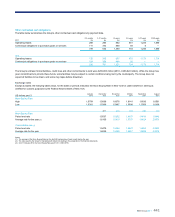 443
443 -
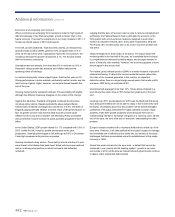 444
444 -
 445
445 -
 446
446 -
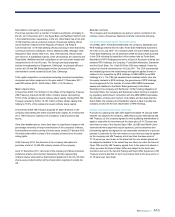 447
447 -
 448
448 -
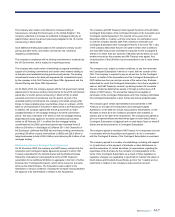 449
449 -
 450
450 -
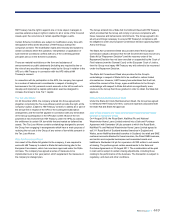 451
451 -
 452
452 -
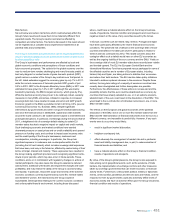 453
453 -
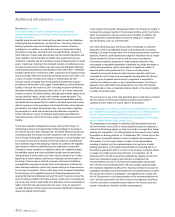 454
454 -
 455
455 -
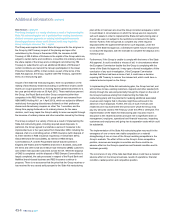 456
456 -
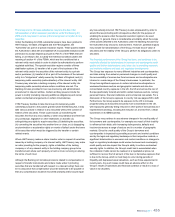 457
457 -
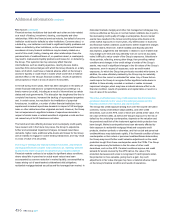 458
458 -
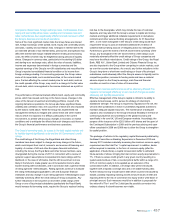 459
459 -
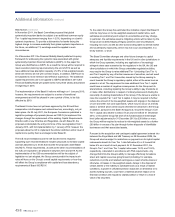 460
460 -
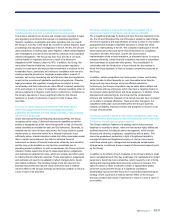 461
461 -
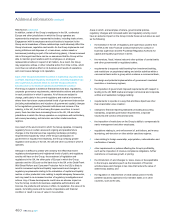 462
462 -
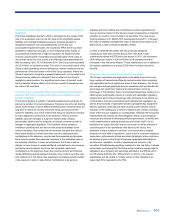 463
463 -
 464
464 -
 465
465 -
 466
466 -
 467
467 -
 468
468 -
 469
469 -
 470
470 -
 471
471 -
 472
472 -
 473
473 -
 474
474 -
 475
475 -
 476
476 -
 477
477 -
 478
478 -
 479
479 -
 480
480 -
 481
481 -
 482
482 -
 483
483 -
 484
484 -
 485
485 -
 486
486 -
 487
487 -
 488
488 -
 489
489 -
 490
490
 |
 |

RBS Group 2011 451
Risk factors
Set out below are certain risk factors which could adversely affect the
Group's future results and cause them to be materially different from
expected results. The Group's results could also be affected by
competition and other factors. The factors discussed in this report should
not be regarded as a complete and comprehensive statement of all
potential risks and uncertainties.
The Group’s businesses and performance can be negatively affected by
actual or perceived global economic and financial market conditions and
by other geopolitical risks
The Group’s businesses and performance are affected by local and
global economic conditions and perceptions of those conditions and
future economic prospects. The outlook for the global economy over the
near to medium-term remains challenging and many forecasts predict at
best only stagnant or modest levels of gross domestic product (GDP)
growth across a number of the Group’s key markets over that period. In
the UK, latest estimates suggest the economy grew by only 1% in 2011,
while the current consensus of forecasts predicts GDP growth of just
0.5% in 2012. GDP in the European Monetary Union (EMU) in 2011 was
estimated to have grown by 1.6% in 2011 (although this was mainly
boosted by Germany, the EMU’s largest economy, which grew by 3%).
While the German economy has proven to be relatively robust, austerity
measures in many EMU economies, initiated in response to increased
sovereign debt risk, have resulted in weak economic and GDP growth.
Economic growth in the EMU is predicted to fall in 2012 by 0.3% (source:
Consensus Economics Inc, Eurostat, ONS). Despite significant
interventions by governments and other non-governmental bodies during
and since the financial crisis in 2008/2009, capital and credit markets
around the world continue to be volatile and be subject to intermittent and
prolonged disruptions. In particular, increasingly during the second half of
2011, a heightened risk of sovereign default relating to certain EU
member states has had a negative impact on capital and credit markets.
Such challenging economic and market conditions have exerted
downward pressure on asset prices and on credit availability and upward
pressure on funding costs, and continue to impact asset recovery rates
and the credit quality of the Group’s businesses, customers and
counterparties, including sovereigns. In particular, the Group has
significant exposure to customers and counterparties within the EU
(including the UK and Ireland), which includes sovereign debt exposures
that have been, and may in the future be, affected by restructuring of their
terms, principal, interest and maturity. These exposures have resulted in
the Group making significant provisions and recognising significant write-
downs in prior periods, which may also occur in future periods. These
conditions, alone or in combination with regulatory changes or actions of
market participants, may also cause the Group to experience reduced
activity levels, additional write-downs and impairment charges and lower
profitability, and may restrict the ability of the Group to access funding
and liquidity. In particular, should the scope and severity of the adverse
economic conditions currently experienced by some EU member states
and elsewhere worsen, the risks faced by the Group would be
exacerbated. Developments relating to the current economic conditions
and unfavourable financial environment, including those discussed
above, could have a material adverse effect on the Group’s business,
results of operations, financial condition and prospects and could have a
negative impact on the value of any securities issued by the Group.
In Europe, countries such as Ireland, Italy, Greece, Portugal and Spain
have been particularly affected by the recent financial and economic
conditions. The perceived risk of default on the sovereign debt of those
countries intensified in the latter part of 2011 particularly in relation to
Greece and has continued into 2012. This raised concerns about the
contagion effect such a default would have on other EU economies as
well as the ongoing viability of the euro currency and the EMU. Yields on
the sovereign debt of most EU member states have recently been volatile
and trended upward. The EU, the European Central Bank and the
International Monetary Fund have prepared rescue packages for some of
the affected countries and a number of European states, including
Ireland, Italy and Spain, are taking actions to stabilise their economies
and reduce their debt burdens. The EU has also taken policy initiatives
intended to address systemic stresses in the eurozone. Despite these
actions, the long-term ratings of a majority of eurozone countries have
recently been downgraded and further downgrades are possible.
Furthermore, the effectiveness of these actions is not assured and the
possibility remains that the euro could be abandoned as a currency by
countries that have already adopted its use, or in an extreme scenario,
abandonment of the euro could result in the dissolution of the EMU. This
would lead to the re-introduction of individual currencies in one or more
EMU member states.
The effects on the European and global economies of the potential
dissolution of the EMU, exit of one or more EU member states from the
EMU and the redenomination of financial instruments from the euro to a
different currency, are impossible to predict fully. However, if any such
events were to occur they would likely:
xresult in significant market dislocation;
xheighten counterparty risk;
xaffect adversely the management of market risk and in particular
asset and liability management due, in part, to redenomination of
financial assets and liabilities; and
xhave a material adverse effect on the Group’s financial condition,
results of operations and prospects.
By virtue of the Group’s global presence, the Group is also exposed to
risks arising out of geopolitical events, such as the existence of trade
barriers, the implementation of exchange controls and other measures
taken by sovereign governments that can hinder economic or financial
activity levels. Furthermore, unfavourable political, military or diplomatic
events, armed conflict, pandemics and terrorist acts and threats, and the
response to them by governments could also adversely affect levels of
economic activity and have an adverse effect upon the Group’s business,
financial condition and results of operations.
